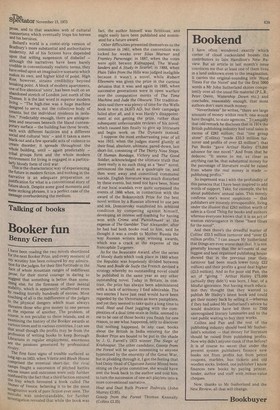Fiction
Modern times
Peter Ackroyd
The History Man Malcolm Bradbury (Secker and Warburg £3.50) High-Rise J. G. Ballard (Jonathan Cape £2.95) Enter the giant race before the Flood, the Kirks, borne along the stream of time by Malcolm Bradbury's wicked present tense: "Howard is a sociologist, a radical sociologist, a small, bright, intense, active man, of whom you are likely to have heard, for he is much heard of. He is on television a good deal, and has written two well known and disturbing books, urging new mores, a new deal for man . . ." And "As for Barbara, well, she is at this minute just a person, as she puts it, trapped in the role of wife and mother, in the limited role of woman in our society . . ." Howard is writing a new book called The Defeat of Privacy and indeed the whole life of the Kirks is devoted — in that knowing but passionate way of our new age — to a series of open encounters, structuring an
informal sort of well . you know, letting it all hang loose, making the scene, naming the names — "structure," "involvement," "interpersonal," "racist."
Malcolm Bradbury constructs his exceedingly self-conscious narrative around these words which glow like beacons, and The History Man becomes a glossary of contemporary diction and the contemporary tone. This would be something of an achievement in itself since I have yet to come across another novel Which effectively utilises that knowing but mannered 'cool' which was merely a phenomenon in the 'sixties, but which has now become institutionalised in the colleges and the universities of the 'seventies. But Bradbury does not simply play the observer — complex though that role is — since he is also a wit, and a moralist. He places all of these mannerisms within a larger although unacknowledged context.
The world, you see, is not simply a transparent superstructure through which the liberated can relate. It retains, even in the modern environment of Howard Kirk, all of its wilfulness and conventional solidity. The party which the Kirks 'throw' at the beginning of the book creates some minor personal problems and one of the guests actually puts his left arm through a window; the university where Howard teaches his radical sociology has been infiltrated by staff and students who resist — to the limit of their meagre powers — the light of the new learning. Even one of Howard's students, George Carmody — "He is a glimpse from another era: a kind of historical offence. In the era of hair, his face is perfectly clean shaven . It is no joke; Carmody wants to be what he says he is." — writes long and conscientious essays, wears white shirts and grey flannels, so he is generally hurt and humiliated by Howard. But Carmody fights back and, just as if he had known the title of Howard's new book all along, checks up on his life-style. The Kirks respond, in the only way they ever really knew. You can be so liberated, it seems, that you can lose touch even with yourself. The History Man is a witty and instructive book, and to detail its plot is almost an injury to the sustained and beautiful surface of Bradbury's prose, and to that seamless web of cultural mannerisms which eventually traps his heroes and his heroines.
Ballard's world is a comic-strip version of Bradbury's more substantial and authoritative modernity. All of his fictions have depended Upon that willing suspension of disbelief — although the nai-ratives have been barely credible in conventionally realistic terms, they have relied upon an imaginative scenario which makes its own, and higher kind of point. High Rise, however, strains credibility beyond breaking point. A block of modern apartments, one of five identical 'units', has been built on an abandoned stretch of London just north of the Thames. It is the last word in superior modern living — "The high-rise was a huge machine designed to serve, not the collective body of tenants, but the individual residents in isolation." Predictably enough, there are antagonmills and neuroses beneath the bland contemporary surface — the building has three 'levels,' each with different facilities and a different social and cultural 'mix' — and it takes a mere black-out and a few sporadic acts of violence to create disorder; it spreads throughout the Whole building, until — again predictably — tribal groups form and the whole modern environment for living is engaged in a particularly bloody form of civil war.
This is the characteristic way of experiencing the future in modern fiction, and nothing in the narrative is an adequate preparation or justification for what is a conventional story of future shock. Despite some good moments and some striking phrases, it is a perfect case of the Message overburdening the medium.



































 Previous page
Previous page